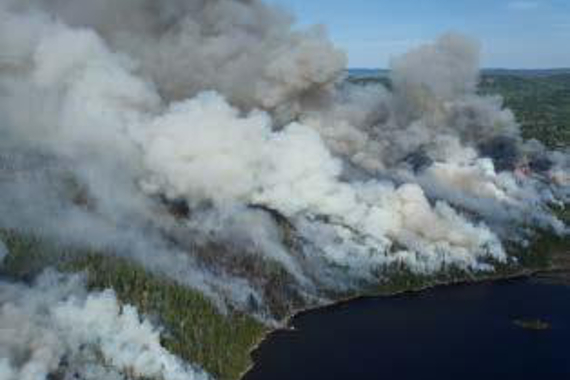
Students participate in New Beginnings to learn how Parks Canada manages fire and understand its role in maintaining forest health.
Fire as a tool, fire as a teacher
Using fire to connect Canadians to Pukaskwa National Park
What’s the issue?

The trees in Pukaskwa National Park are getting old, and the forest is less diverse and less healthy as a result. The cause in part is decades of fire suppression – a decision that slowly changed forest composition and hampered forest renewal. That’s because many species rely on fire to thrive – jack pine seeds are released only when exposed to intense heat – and lots of wildlife come along for the ride; for example, black-backed woodpeckers feed on wood-boring insects found in burned forests. In response to a noticeable decline in forest health, Parks Canada started to light controlled or “prescribed” fires in Pukaskwa starting in the late 1990s, actively restoring the forest landscape. This change in strategy has also been used as a teaching opportunity; park visitors and others can now learn about the vital function of fire in forest renewal.
What’s our approach?
- Restore the historic fire cycle by limiting suppression of wildfire.
- Develop prescribed fire plans that mimic the historic fire cycle.
- Apply fire to burn up to 850 hectares in the Willow Lake and Perry Lake area.
- Collaborate with researchers to enhance our understanding of fire in the region and adapt management.
- Provide new opportunities for visitors to enjoy the park while learning about fire and fire management at Parks Canada.
What’s been accomplished?
- Completed plans to apply prescribed fire when conditions are right.
- Conducted prescribed fire near Willow Lake and protective guard burns at Perry Lake, totalling 228 hectares.
- Supported Lakehead University research comparing regional vs. local differences in fire severity, to better inform prescribed fire plans.
- Developed an exhibit promoting the ecological benefits of fire installed at the Canadian Bushplane Heritage Centre (2016) and the Land Use Summit at Pic Mobert First Nation (2017).
- Developed fire programming for visitors; New Beginnings provides students with a hands-on fire crew experience.
- Date modified :